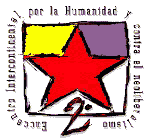
2nd Intercontinental Encounter of Peoples against Neo-liberalism
Summary of arguments discussed at Table 1c (Alternative Economy) CSO El Laboratorio, Madrid
28 July 1997
In the morning the members of the working groups introduced themselves. The round table was made up of 47 people from 14 different nationalities (Italy, France, Mexico, Cameroon, Australia, Germany, Spain, Euskadi, Morocco, Sweden, Belgium, Chile, Argentina and Switzerland) involved in groups or as individuals in a range of movements of struggles, from rank and file unionism to the voluntary sector, from the self-management of occupied spaces to liberation theology, from anarchism to fair and equitable trade. The discussion developed in four languages -- Spanish, English, Italian and French -- working around the global concept of an alternative economy (exchange of experiences, proposals for struggle, possibilities for coordinating struggles against neo-liberalism etc). It was decided that during the afternoon session each would speak of their experiences of struggle, so as to furnish a basis for debate in the days to follow. The arguments advanced in the afternoon entailed:
1) An experience of international cooperation for the self-managed popular economy in Nicaragua which involves around 20,000 Nicaraguan families. These groups of workers have formed cooperatives for the production of coffee, rice, bananas and other products, as well as associations concerned with foreign trade. This is a self-managed mutualist [associazionista] popular economy created from below, from civil society. In Nicaragua there are 8 million hectares of arable land, of which half was divided amongst families, peasants, mutualist enterprises and agricultural cooperatives following the Sandanista revolution. While the arrival of Violeta Chamorro's government meant that many state enterprises were privatised, these workers were partly successful in bouncing back, fighting capitalism on its own ground (property, enterprise). These people have a long experience of managing a relationship with the land, one oriented not towards making money, but rather a more social existence. In this way a self-managed economy was created in order to satisfy people's basic needs and to combat all forms of social exclusion. Thanks to self-management the commodification of the workforce has been avoided (the workers have become the bosses of their enterprises). Relations with the market have not been refused, but rather managed differently. Through the birth of a network of cooperatives the workers have created their own bank and a university. Efforts are currently underway to establish direct, unmediated contacts between Nicaraguan producers and European consumers. These instances of self-management were born as a result of problems caused by cuts to social spending. At the same time, capitalist dynamics -- for example, marked pay differences between various levels of workers -- have been known to rear their heads within these firms.
2) The French Time Bank is concerned with the exchange of hours of manual and intellectual labour amongst members. The value of services, being relative and decided on a case-by-case basis, is detached from the value of money. Decisions are taken at a general assembly. There are no office-bearers, and the rules can be changed at any assembly. Every 3 months a bulletin is published which lists the members' wants. Members contact each other directly and make their exchanges according to 2 different criteria: a) creating an alternative economy; b) other members exchange services without assigning a precise political valuation to the thing. One limit of this experience is that it isn't possible to construct machinery (?) [macchinari], which couldn't be acquired in any case as this would entail the use of money. It's not possible to exchange everything or what's been produced for what one needs.
[Hmm -- those last two sentences were doozies. Here, for those who wish to correct my Italian, are the originals: Un limite di questa esperienza è che non è possibile costruire macchinari, che d'altra parte non possono nemmeno essere comperati perchè ciò comporterebbe l'utilizzo di denaro. Non è possibile scambiare tutto quello che si produce con ciò di cui si necessita.]
3) Experiences of self-management and occupation in Madrid. The occupation of the 'Laboratory' in Madrid followed the eviction of 'La Guindalerà social centre in which 160 people had been arrested. This in turn had helped to draw more into the movement, including people on the city's periphery. At present there are a range of self-funded experiences within the Laboratory, including a bar, a second-hand shop, a tea salon, and a self-managed cafe. These were able to finance the activities of the centre, such as the political collectives, the solidarity funds for legal costs, and were proof that one can self-organise in spite of the power structure. The demands which had led to the experience of occupations included the right to a roof over one's head, the right to self-managed work, the possibility of having spaces for cultural activities.
4) No-profit (Italy). The Italian situation encompasses cooperatives, social centres, organisations for fair and equitable trade, ethical banks, and voluntary associations. Some of these operate according to entrepreneurial criteria, others have become instrumentalised as surrogates for cuts to the welfare state. The problem is how to unite these diverse realities and avoid social fragmentation and the loss of forces and impetus.
5) Foreign debt and economic control in Cameroon. The negative effects of neo-liberalism in Cameroon have struck the poorest most of all, who face real problems in the provision of health, education, and on the job front. This situation has been provoked by the serious foreign debt, which has absorbed most of the state's income. There are projects by a local NGO concerning a) education, mobilising young unemployed graduates; b) health, providing information and prevention of disease, above all those that are sexually transmitted; c) work, through the establishment of courses of professional preparation, and seeking to create the conditions for a reduction in working hours, while guaranteeing a minimum wage for all.
Written by Kollettivo Estrella Roja - Cesena and collettivo Chiapas Rimini
Translated by Steve Wright, Zapatista Solidarity Collective, Melbourne Australia